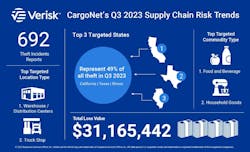In a trend that shows no signs of slowing, cargo theft for the third quarter of 2023 increased 59% year-over-year after comparable increases in quarters one and two, according to a report from freight security network CargoNet.
CargoNet recorded 692 instances of theft across the U.S. and Canada last quarter, largely as part of a continuing trend of shipment misdirection attacks, a type of fraud in which thieves use stolen motor carrier or broker identities to obtain freight. In total, thieves stole over $31.1 million in shipments in the third quarter of 2023.
Thefts increased in each of CargoNet’s event categories. Theft by fraud—also called strategic theft—increased 430% year-over-year. Theft of entire trailers or trucks increased 4% since Q3 2022. There was also a jump in the Cargonet’s "other" category, which combines several types of reports like identity theft complaints, hostage loads, late shipment complaints, and other kinds of criminal intelligence records. Strategic theft is expected to remain at “unprecedented levels of activity throughout the quarter,” according to the report.
See also: DAT introduces AI-powered identity-verification to combat fraud
Theft was most common in the freight hubs of California, Texas, Florida, Georgia, and Illinois, which are perennial hot spots. However, for the first time, Arizona appeared in the top 10 most-targeted states due to both strategic theft and pilferage—the theft of partial loads of cargo, versus burglary of entire shipments or appropriation of entire trailers, trucks, or containers.
“Pilferages in Arizona are isolated to just two parts of the state: Lake Havasu—exit 9 off I-40—and then as you get further in, the Flagstaff area,” Keith Lewis, CargoNet vice president of operations, told FleetOwner. “The trailers are being followed out of California. And that's where they're pilfering. They're waiting for the drivers to go to sleep, or bed down for the night, or leave the truck and go in and get something to eat, and then they're breaking into the back of the trailer.”
See also: For sophisticated cargo thieves, use advanced tools
Stolen cargo is often reintroduced back into the legitimate market largely through supply chain diverters. These supply chain diverters are actors, usually legitimate, that buy overstocked supply or loads that a receiver refused, then resell those items to another business or to auctions to be sold off, according to Lewis. Once reintroduced into the legal marketplace, freight becomes highly difficult to recover.
“I worked a lot of these cases where the bad guy steals a load of, say, tuna fish—this is a true story—steals a load of tuna fish and takes it to a public warehouse, and they book it in a public warehouse. So what does it do? It generates a warehouse ticket, and then when you ship it out, it generates a bill of lading. And when you generate that bill of lading, you basically legitimize the product. It's almost like washing dirty money.”
In other cases, freight is shipped out of the country by organized crime, including criminal organizations that originate overseas.
“A lot of them—the shot callers, if you will—are based out of Eastern Europe, so we’re seeing this move from a national problem to a transnational problem,” Lewis said. “It’s something that we stumbled upon after COVID, that we can work from home, and we can work from anywhere on the planet.”
See also: Clark: Is your fleet vulnerable to fraud?
Thieves have broadened their targets to include truckload shipments of metal, particularly copper, brass, and aluminum. Clothing—especially licensed sports apparel—has been a frequent target, as have been personal care and beauty products. Solar panels have continued to be stolen, and energy drinks have been commonly looted as well.
“Back in the day when I first started working cargo theft, the big commodity was cigarettes. You make it for a penny, sell it for $1, it’s legal, and it’s an addictive substance,” Lewis said. “When it becomes an addictive product it’s in high demand. And what we saw, the big increase this year, is they’re being exported. A lot of countries have banned energy drinks, and,” he added, “the countries that haven’t banned them, the energy drink companies have made special limited editions for those countries.”
How motor carriers can prevent cargo theft
What are carriers to do as cargo theft becomes increasingly commonplace?
“If I had a secret recipe, I’d sell it,” Lewis said.
Vigilance and appropriate vetting is paramount, he added. There are warning signs, such as if several trucking companies are using the same P.O. box. Carriers should be careful when reading emails and determine whether the addresses are attached to legitimate domain names.
Holidays are high-risk times for theft as trucks are left unattended. Additionally, Lewis said there is less stringent vetting as workers get a “euphoric feeling” in the days leading to the holiday and are rushing to get freight off the dock. Ensure that your operation is not lax on security during these times.
Many owners of smaller fleets use dispatch services to solicit loads. However, according to Lewis, many of those services are overseas, and some are bad actors that, now that they have a carrier’s information, are able to steal loads. Lewis recommended not outsourcing dispatch.
Carriers should remain alert as cargo theft trends are not reversing—and criminals are becoming bolder.
“If I'm a bad guy, and I'm going to steal one load at a time, why not steal four? And that's what we've seen over the last couple of weeks,” Lewis said. “We've got two of our members—both of them were victims for loads on the same day by the same bad actor. So another tip is, if somebody is booking five loads with you, and they say, ‘Yeah, we got four trucks that just got empty in Cincinnati. We need to get them out.’ … Well, maybe not so fast. Look below the iceberg.”
Additionally, CargoNet regularly releases data on theft trends and hot spots that carriers can use to improve security.
About the Author
Scott Keith
Scott Keith is a former fleet owner digital editor, who was on staff from 2022 to 2023.


